The Economics and Statistics Division maintains archives of previous publications for accountability purposes, but makes no updates to keep these documents current with the latest data revisions from Statistics Canada. As a result, information in older documents may not be accurate. Please exercise caution when referring to older documents. For the latest information and historical data, please contact the individual listed to the right.
<--- Return to Archive
For additional information relating to this article, please contact:
August 31, 2021COMPENSATION OF EMPLOYEES Q2 2021 With Q2 reference results, year-over-year (Q2 2021 vs Q2 2020) and year-to-date (Q1-Q2 2021 vs Q1-Q2 2021) are showing the rebounds in economic activity from the unprecedented declines observed at the start of the COVID-19 pandemic.
Nova Scotia’s seasonally adjusted employee compensation (wages+salaries+employer social contributions) increased 0.3% in the second quarter of 2021 to $6,513 billion. Employee compensation in the second quarter was up 10.5% in Nova Scotia when compared to the second quarter of 2020.
The wages and salaries portion of employee compensation increased 0.3% to $5,594 billion in the second quarter. On a year-over-year basis, wages and salaries were up 10.4% in the second quarter. In Q2 2021, employer's social contribution was down 0.1% compared to Q1 but up 10.9% compared to Q2 2020.

Monthly employee compensation has been above February 2020 pre-COVID levels since October 2020. As of June 2021 employee compensation is 3.2% higher than February 2020, with wages and salaries up 3.1% and employer’s social contributions up 3.5%.
Compared to June 2020, employee compensation increased 9.3%, with wages and salaries up 9.3% and employer’s social contributions up 9.4%.
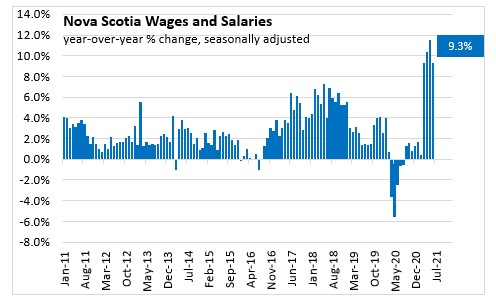
In the second quarter of 2021, Canada’s employee compensation was up 1.4% from the previous quarter with all provinces registering gains. Quebec (+2.8%) and Alberta (+2.8%) posted the largest increases in the second quarter. The smallest percentage increases were in Nova Scotia (+0.3%) and Ontario (+0.3%).
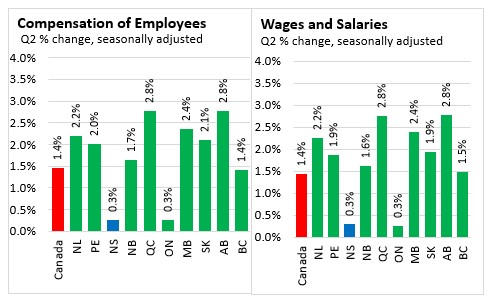
In the first half of the year, Canada's employee compensation increased 8.6% compared to January-June 2020. All provinces had increases. The largest percentage increase was in Prince Edward Island (+12.4%).
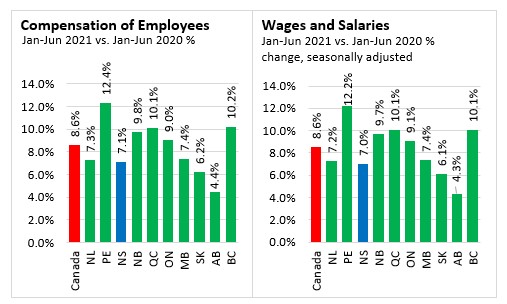
The COVID-19 pandemic resulted in compensation of employees falling in all provinces in March and April 2020. May 2020 compensation of employees was mixed before a recovery in compensation occurred over June through October. Compensation in November 2020 generally declined in most provinces and growth rates were fairly minimal in December 2020 and January 2021. March 2021 had rising compensation in all provinces. Employee compensation declined in April and May 2021 but started to rebound in June 2021.
Compared to February 2020, all provinces had higher compensation of employees in June 2021 except Alberta where employee compensation was the same as February 2020. The largest increase from February 2020 to June 2021 was in Prince Edward Island (+9.9%).
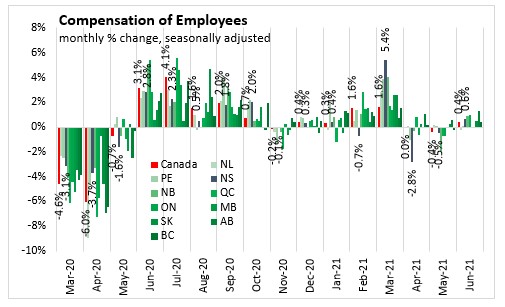
Comparing the seasonally unadjusted data for Q2 2021 with the same quarter in 2020, total wages and salaries increased 10.3% in Nova Scotia. The largest increase were in agriculture, forestry and fishing (+41.3%) and construction (+24.5%). Lower compensation of employees occurred with mining, oil and gas extraction (-10.6%) and educational services (-1.5%).

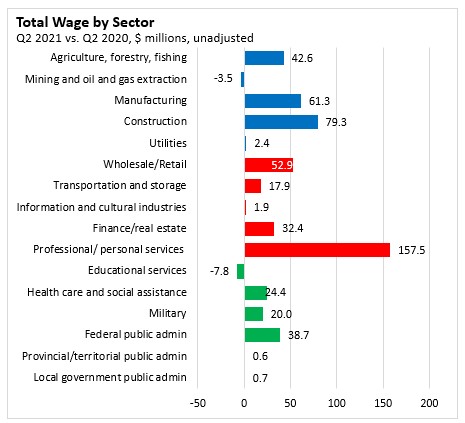
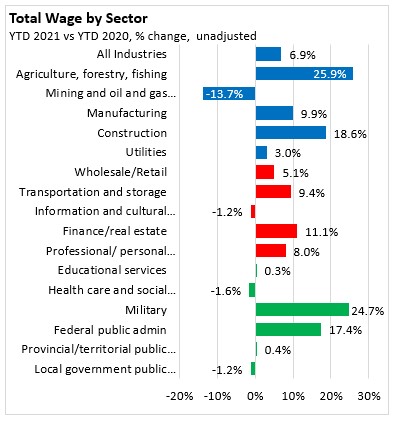
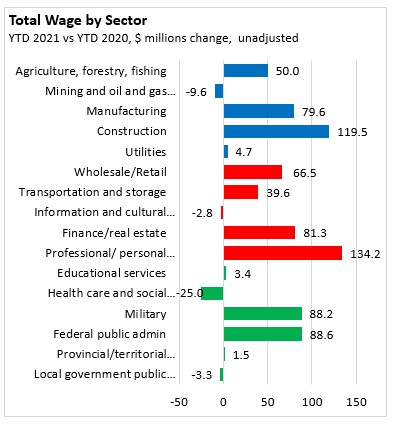
Note: comparison of wages and salaries by sector rely on data that are neither seasonally adjusted nor adjusted to reflect differences in pay periods from one year to the next. Compensation of employees data includes wage and salaries income that is supported by government subsidy programs including COVID measures such as the Canadian Emergency Wage Subsidy.
Statistics Canada. Table 36-10-0205-01 Wages, salaries and employers' social contributions (x 1,000)
<--- Return to Archive